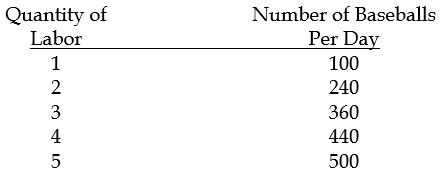
1. The demand for
labor by a particular firm is ultimately derived from
a. the productivity of labor.
b. the productivity of the firm’s other inputs.
c. demand for the firm’s output.
d. the market supply of labor.
2. If the demand for
automobiles increases, which of the following markets would also experience an
increase in demand?
a. automobile workers
b. bicycle manufacturers
c. bus drivers
d. financial analysts
3. Which of the
following is an assumption made about a competitive labor market?
a. A firm must offer a higher wage rate to attract more
labor.
b. A firm must offer a lower wage rate to attract more
labor.
c. A firm cannot influence the market wage rate.
d. The labor supply curve facing a firm is relatively
inelastic.
4. If eight workers
can manufacture 70 tables per day and nine workers can manufacture 90 tables
per day, and if tables can be sold for $10 each, the value of marginal product
of the ninth worker is
a. 20 tables.
b. 90 tables.
c. $200.
d. $900.
5. An increasing
marginal product of labor would be most commonly found
a. at high levels of employment.
b. in perfect competition.
c. at low levels of employment.
d. when prices are rising.
6. If a firm is a
price taker in the labor market, then the value of the marginal product of
labor equals labor’s marginal
a. product.
b. product multiplied by the price of the final product.
c. product times the wage rate.
d. product divided by the wage rate.
7. Value of marginal
product is defined as the additional
a. output a firm would receive after hiring one more unit of
resource.
b. cost of hiring one more unit of resource.
c. revenue earned by selling one more unit of product.
d. revenue earned by hiring one more unit of resource.

8. This table
describes the number of baseballs a manufacturer can produce per day with
different quantities of labor. Each baseball sells for $5 in a competitive
market. For which level of employment is the marginal product of labor
greatest?
a. 1 worker
b. 2 workers
c. 3 workers
d. 4 workers
9. This table
describes the number of baseballs a manufacturer can produce per day with
different quantities of labor. Each baseball sells for $5 in a competitive
market. The total revenue per day for the firm if it employs five workers is
a. $500.
b. $300.
c. $2200.
d. $2500.
10. This table
describes the number of baseballs a manufacturer can produce per day with
different quantities of labor. Each baseball sells for $5 in a competitive
market. The value of marginal product when marginal product is maximized is
a. 140 baseballs.
b. $300.
c. $400.
d. $700.
11. The imposition of
tariffs and quotas on imported goods tends to cause the
a. demand curve for domestic labor to shift to the right.
b. demand curve for domestic labor to shift to the left.
c. supply curve of domestic labor to shift to the right.
d. supply curve of domestic labor to shift to the left.
12. Bill is trying to
convince the owner of a pizza shop to hire him. He argues that he could help
the shop sell an additional five pizzas per day at the market price of $8 each.
If the facts are not in dispute, but the owner does not hire him, then
a. the wage rate must be less than $40 per day.
b. hiring Bill would involve a negative marginal product.
c. the wage rate must be more than $40 per day.
d. the wage rate must be less than $8 per day.
13. A labor supply
curve that has a negatively sloped portion is said to be
a. a zero elasticity of labor supply.
b. a kinked labor supply curve.
c. backward bending.
d. perfectly inelastic.
14. The migration of
unskilled workers from Mexico to the United States tends to
a. increase the number of jobs for unskilled American
workers.
b. decrease the wage rate for unskilled American workers.
c. increase the wage rates for skilled American workers.
d. decrease the number of jobs for skilled American workers.
15. A decrease in the
supply of auto workers could be the result of
a. higher wages paid to workers in other industries.
b. an increase in the value of the marginal product of auto
workers.
c. improving tastes and preferences for automobiles.
d. an increase in the total product of auto workers.
16. This table shows
the number of calculators that can be assembled per month by various numbers of
workers. If the price per calculator in a perfectly competitive product market
is $20, how many workers would the firm employ if the monthly wage rate is
$1000?
a. 1
b. 2
c. 3
d. 4

17. Wally’s Wheat
Farm sells its output and hires its labor in perfectly competitive markets. In
the short run, Wally can vary only one input—labor. When Wally is producing in
short-run equilibrium, all of the following conditions, except one, will
necessarily be satisfied. Which is the exception?
a. The value of marginal product of labor equals the wage
rate.
b. The marginal cost curve crosses the marginal revenue
curve from below.
c. Marginal revenue equals the price of the firm’s output.
d. The firm’s total revenue will decrease if more labor is
hired.
18. A perfectly
competitive firm should hire additional units of labor in a competitive labor
market when
a. marginal revenue is less than marginal cost.
b. the value of marginal product exceeds the wage rate.
c. total revenue exceeds total cost.
d. the marginal product of labor exceeds the wage rate.
ANSWER: b the value of marginal product exceeds the wage
rate.
SECTION: 3 OBJECTIVE: 3
19. Concerning the
market for radio assemblers, assume that the wage rate is $12 per hour in the
U.S. and $3 per hour in Mexico. Also suppose that the marginal product of a
Mexican worker is 3 radios per hour. A U.S. worker will be less costly to
employ than the Mexican worker if the marginal product of the U.S. worker is at
least
a. 4 radios per hour.
b. 8 radios per hour.
c. 12 radios per hour.
d. 16 radios per hour.
20. A new technology
that increases the productivity of teachers has what effect on the labor market
for teachers?
a. The wage rate will rise, and quantity of teachers
employed will fall.
b. The wage rate will rise, and the quantity of teachers
employed will rise.
c. The wage rate will fall, and quantity of teachers
employed will fall.
d. The wage rate will fall, and the quantity of teachers
employed will rise.
21. If the
productivity of capital increases, the
a. supply curve of capital shifts to the right.
b. interest rate decreases.
c. firm’s VMP of capital increases.
d. firm’s VMP of capital decreases.
22. The value of
marginal product of capital is the increase in
a. output that results from employing one more unit of
capital.
b. profit that results from employing one more unit of
capital.
c. revenue that results from employing one more unit of
labor.
d. revenue that results from employing one more unit of
capital.
23. When the price of
capital increases, the
a. quantity demanded of loanable funds by the firm will
decrease.
b. quantity demanded of loanable funds by the firm will
increase.
c. firm’s VMP of capital increases.
d. firm’s MP of capital increases.
24. Human capital is
a. the plants and equipment owned by people.
b. computers, autos, and other durable goods owned by
households.
c. the amount of money people save.
d. the skills, knowledge, and abilities of people.
25. A decrease in
population can be expected to
a. raise land rent.
b. increase the supply of land.
c. decrease the demand for land.
d. increase the demand for land.
No comments